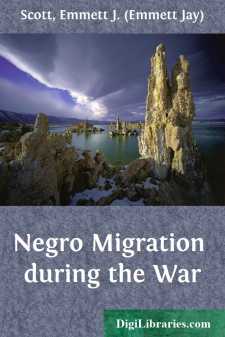Categories
- Antiques & Collectibles 13
- Architecture 36
- Art 48
- Bibles 22
- Biography & Autobiography 813
- Body, Mind & Spirit 142
- Business & Economics 28
- Children's Books 17
- Children's Fiction 14
- Computers 4
- Cooking 94
- Crafts & Hobbies 4
- Drama 346
- Education 46
- Family & Relationships 57
- Fiction 11829
- Games 19
- Gardening 17
- Health & Fitness 34
- History 1377
- House & Home 1
- Humor 147
- Juvenile Fiction 1873
- Juvenile Nonfiction 202
- Language Arts & Disciplines 88
- Law 16
- Literary Collections 686
- Literary Criticism 179
- Mathematics 13
- Medical 41
- Music 40
- Nature 179
- Non-Classifiable 1768
- Performing Arts 7
- Periodicals 1453
- Philosophy 64
- Photography 2
- Poetry 896
- Political Science 203
- Psychology 42
- Reference 154
- Religion 513
- Science 126
- Self-Help 84
- Social Science 81
- Sports & Recreation 34
- Study Aids 3
- Technology & Engineering 59
- Transportation 23
- Travel 463
- True Crime 29
Negro Migration during the War
Description:
Excerpt
CHAPTER I
Within the brief period of three years following the outbreak of the great war in Europe, more than four hundred thousand negroes suddenly moved north. In extent this movement is without parallel in American history, for it swept on thousands of the blacks from remote regions of the South, depopulated entire communities, drew upon the negro inhabitants of practically every city of the South, and spread from Florida to the western limits of Texas. In character it was not without precedent. In fact, it bears such a significant resemblance to the migration to Kansas in 1879 and the one to Arkansas and Texas in 1888 and 1889 that this of 1916-1917 may be regarded as the same movement with intervals of a number of years.
Strange as it might seem the migration of 1879 first attracted general notice when the accusation was brought that it was a political scheme to transplant thousands of negro voters from their disfranchisement in the South to States where their votes might swell the Republican majority. Just here may be found a striking analogy to one of the current charges brought against the movement nearly forty years later. The congressional inquiry which is responsible for the discovery of the fundamental causes of the movement was occasioned by this charge and succeeded in proving its baselessness.
The real causes of the migration of 1879 were not far to seek. The economic cause was the agricultural depression in the lower Mississippi Valley. But by far the most potent factor in effecting the movement was the treatment received by negroes at the hands of the South. More specifically, as expressed by the leaders of the movement and refugees themselves, they were a long series of oppression, injustice and violence extending over a period of fifteen years; the convict system by which the courts are permitted to inflict heavy fines for trivial offenses and the sheriff to hire the convicts to planters on the basis of peonage; denial of political rights; long continued persecution for political reasons; a system of cheating by landlords and storekeepers which rendered it impossible for tenants to make a living, and the inadequacy of school facilities. Sworn public documents show that nearly 3,500 persons, most of whom were negroes, were killed between 1866 and 1879, and their murderers were never brought to trial or even arrested. Several massacres of negroes occurred in the parishes of Louisiana. Henry Adams, traveling throughout the State and taking note of crime committed against negroes, said that 683 colored men were whipped, maimed or murdered within eleven years.
In the year 1879, therefore, thousands of negroes from Mississippi, Louisiana, Texas, Alabama, Tennessee and North Carolina moved to Kansas. Henry Adams of Shreveport, Louisiana, an uneducated negro but a man of extraordinary talent, organized that year a colonization council. He had been a soldier in the United States Army until 1869 when he returned to his home in Louisiana and found the condition of negroes intolerable....



